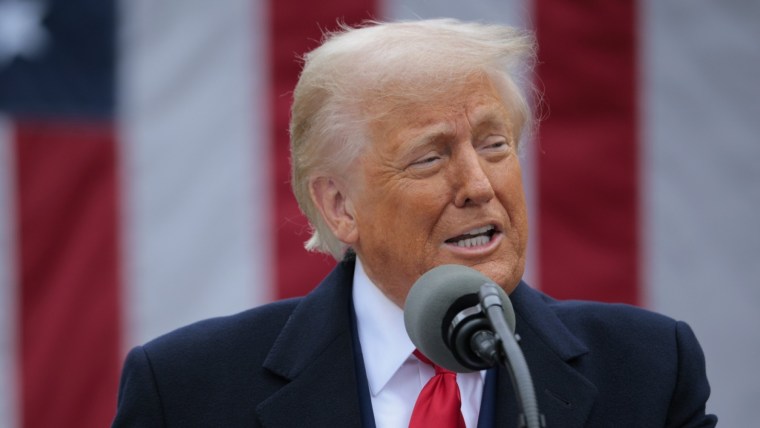Find live coverage of President Donald Trump's tariff policies here.
What to know today
- President Donald Trump confirmed his long-threatened reciprocal tariffs today. It's the latest move in his effort to shift global trade by levying taxes against goods shipped into the United States.
- Importers seeking to bring in goods to the United States from other countries will now face tariffs as high as 54% based on how the White House is calculating duties on U.S. exports, as well as "nonmonetary" trade barriers based on countries' doing things like manipulating their currencies or serving as "pollution havens."
- The result was a list of tariffs that are set to impose major duties on billions — if not trillions — of dollars in trade. China, one of the United States' largest trading partners, would be hit with a 54% tariff, the European Union with 20%, India with 26% and Japan with 24%, among many others.
- U.S. stock markets sharply reversed earlier gains as Trump made his remarks. In after-hours trading, S&P 500 futures fell 1.5%.
The White House math behind its reciprocal tariffs
Trump’s so-called reciprocal tariffs, which are paid by U.S.-based companies importing products into the United States, vary by country, ranging from a minimum of 10% to more than 40%. To determine the amounts of those reciprocal tariffs, the U.S. Trade Representative’s Office used a formula to calculate the tariff rate necessary to balance trade deficits between the United States and its trading partners, according to a statement posted on the trade representative’s website.
The formula took into account a variety of factors that can put U.S. products at a disadvantage, like regulatory requirements, environmental reviews, differences in consumption tax rates and currency manipulation, the statement said.
“If trade deficits are persistent because of tariff and non-tariff policies and fundamentals, then the tariff rate consistent with offsetting these policies and fundamentals is reciprocal and fair,” it said.
The calculation assumes that America’s trade deficits with its trading partners — which occur when the United States imports more than it exports to those countries — are the result of tariffs and trade barriers that limit U.S. exports to them. The tariffs are intended to reduce imports from that trading pattern to balance out the trade deficit.
Unpopulated, remote island not immune from Trump's tariffs
The sweeping tariffs Trump announced today stretched around the globe, including the remote Heard and McDonald Islands, which are populated by zero humans but lots of seals and penguins.
Despite having no apparent exports or imports, the sub-Antarctic islands, which are an external territory of Australia, will be subject to a 10% tariff, according to a document the White House provided during Trump’s tariff announcement today.
Other tiny nations and territories were also hit with 10% tariffs, including Tokelau, a dependent territory of New Zealand, with a population of around 1,600 people, and the Cocos Islands, another territory of Australia, with a population of around 600 people.
Some Republican senators concede tariffs could cause 'short-term pain'
A handful of Republican senators told NBC News tonight that Trump's decision to place tariffs on more than 180 countries and territories could lead to short-term pain for U.S. consumers in the form of higher prices.
“Sometimes in business you have to have short-term pain to have long-term gain, and we don’t think this is even going to be that long of a short term, if it is at all. We trust the president,” Sen. Markwayne Mullin, R-Okla., said.
Sen. Cynthia Lummis, R-Wyo., said Trump acted "pretty responsibly" in implementing the tariffs but still acknowledged "there could be short-term pain" in response to the import penalties.
"I’m looking forward to seeing how they work. We already have countries that have approached the president to say: 'We want to work with you. We’ll lower our tariffs, if you lower yours,'" Lummis said.
Sen. John Kennedy, R-La, said he's confident Trump will reconsider the tariffs if there's a significant impact on U.S. consumers.
"If they make things better, they should want more. If it makes things worse, they should want to recalibrate," Kennedy said. "If the tariffs end up hurting America, I think you’ll see President Trump recalibrate."
JP Morgan economist: Tariffs could push the U.S. into recession
JP Morgan chief economist Michael Feroli said in a note that Trump's tariffs would bring in considerable revenue but at the expense of higher prices that could hit consumer purchasing power.
"On a static basis, today’s announcement would raise just under $400 billion in revenue, or about 1.3% of GDP, which would be the largest tax increase since the Revenue Act of 1968," he wrote. "We estimate that today’s announced measures could boost PCE prices by 1-1.5% this year, and we believe the inflationary effects would mostly be realized in the middle quarters of the year."
He continued: "The resulting hit to purchasing power could take real disposable personal income growth in 2Q-3Q into negative territory, and with it the risk that real consumer spending could also contract in those quarters. This impact alone could take the economy perilously close to slipping into recession."
Treasury secretary warns countries hit by tariffs not to retaliate
Treasury Secretary Scott Bessent warned countries hit by Trump's new tariffs not to retaliate.
"I wouldn’t try to retaliate," Bessent said in an interview this evening with Bloomberg Television. "As long as you don’t retaliate, this is the high end of the number."
He repeated the sentiment on Fox News, telling "Special Report" host Bret Baier that any retaliation would result in heightened tariffs from the United States.
"Do not retaliate," he said. "If you retaliate, there will be escalation."
Business Rountable CEO warns universal tariffs could cause economic harm
The CEO of Business Roundtable, a lobbying group made up of chief executives of major U.S. companies, said in a statement that Trump's universal tariffs risk damaging the economy.
“Business Roundtable supports President Trump’s goal of securing better and fairer trade deals with our trading partners, including by lowering tariffs on U.S. exports and expanding market access," CEO Joshua Bolten wrote. "However, universal tariffs ranging from 10-50% run the risk of causing major harm to American manufacturers, workers, families and exporters. Damage to the U.S. economy will increase the longer the tariffs are in place and may be exacerbated by retaliatory measures."
“We urge the Administration and our top trading partners to swiftly reach agreements that level the playing field for American goods and services and remove these tariffs. While negotiations are underway, we strongly encourage the Administration to implement additional reasonable exemptions and put in place a transparent, predictable exclusion process.”
Asian stocks drop sharply minutes into trading
The major stock indexes in Asia dropped sharply just minutes into their trading days.
Japan’s Nikkei 225 index plunged more than 4.1%, and South Korea’s Kospi stock average fell more than 2.5%. Australia’s ASX 200 dipped about 2%.
ETFs (exchange-traded funds) that track specific countries, such as India, tumbled about 3%, while one that tracks Europe slid 2%, and the China ETF fell 3.8%.
Former VP Pence calls tariffs 'largest peacetime tax hike in U.S. history'
Mike Pence, Trump's former vice president, came out forcefully against Trump's new tariffs, saying on X that they constituted a major tax hike.
"These Tariffs are nearly 10x the size of those imposed during the Trump-Pence Administration and will cost American families over $3,500 per year," Pence wrote, pointing to an analysis from Advancing American Freedom, a nonprofit group he founded to advocate for conservative policies and values.
Senate passes measure to terminate Trump's tariffs on Canada
A pivotal group of Senate Republicans delivered a rebuke to Trump’s tariffs on Canadian products as he escalated his broader trade war today.
The Senate voted 51-48 to pass a Democratic resolution to block Trump’s Canadian tariffs from taking effect. Four Republicans — Susan Collins of Maine; Rand Paul and Mitch McConnell of Kentucky; and Lisa Murkowski of Alaska — joined all 47 Democrats in supporting the measure.
The resolution, authored by Tim Kaine, D-Va., is not expected to go anywhere in the House. But it was notable several Republicans broke with Trump the day he announced a new set of sweeping tariffs, which the White House billed as “Liberation Day.”
“If these tariffs go into effect, it will be so harmful,” Collins said in a speech on the Senate floor before the vote. “And as price hikes always do, they will hurt those the most who can afford them the least.”
Trump’s trade war is just getting started
President Donald Trump has favored tariffs for years. His expanding trade war is sure to ripple through the global economy for a long while, too.
That’s because ramping up tariffs on foreign governments frequently draws retaliation — a likelihood that even industries Trump aims to support are already bracing for. While he has been rolling out an ever-shifting series of import taxes for months, the sweeping “reciprocal” tariffs he announced Wednesday are opening salvos in what could become drawn-out tit-for-tats with potentially dozens of governments.
Unlike the narrower, targeted tariffs Trump imposed on certain countries and products in his first term, his latest duties are set to rewrite the rules of global trade on a far broader level — and in an environment in which inflation is running hotter.
“This is a game changer, not only for the U.S. economy but for the global economy,” Olu Sonola, head of U.S. economic research at Fitch Ratings, said in a note Wednesday evening.
“Many countries will likely end up in a recession. You can throw most forecasts out the door, if this tariff rate stays on for an extended period of time,” she said, adding that the levels Trump is introducing haven’t been seen since 1910.
Already, the administration is signaling it’s uninterested in diplomacy, raising the odds that foreign leaders will hit back with more levies of their own rather than press for talks.
“This is not a negotiation,” a senior White House official told reporters Wednesday evening. “It’s a national emergency.”
The European Union has threatened countermeasures by mid-April, and Canada warned last week that it was preparing retaliatory moves to respond swiftly to any trade actions the United States were to unveil Wednesday.

